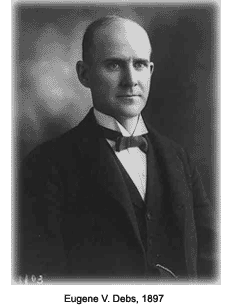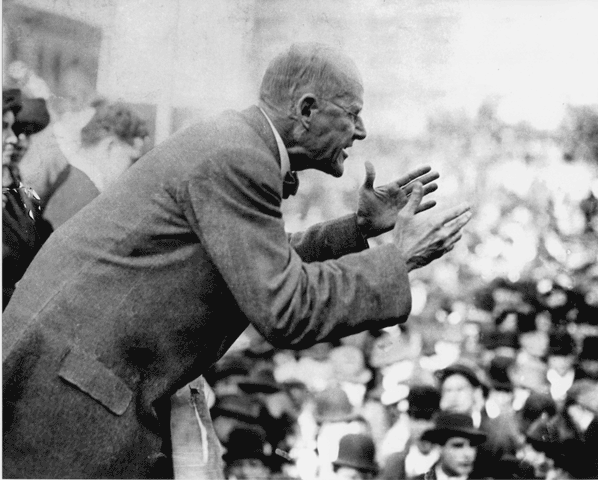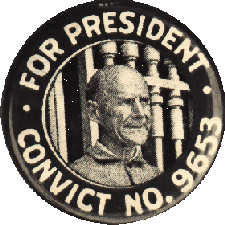
Eugene Victor Debs
(1855-1926)

Eugene Victor Debs was born on November 5, 1855 in Terre Haute, Indiana. Eugene was one of six surviving children and the first born son. His parents owned a small grocery store that was in one of the front rooms of their two-story home. The Deb's household fostered an intellectual spirit that grew within Eugene Debs. At the age of fourteen Debs left school to become a paint scraper for the Terre Haute and Indianapolis Railroad. Debs found his calling amongst the rail-workers, which was to be the champion of industrial workers everywhere in the United States. His career would span some of the most turbulent times in American labor history, and he would leave a legacy of tenacious fighter for the common man and the good of all.
After returning to Terre Haute, because his family was worried about his safety, while working for the Railroad. He started working as a warehouse worker for a friend of his father. It was while he was working in the warehouse that Debs and a group of his friends founded the Occidental Literary Club. His participation in this club was to prove fundamental to his development as a labor leader. This was because Eugene Debs had many popular speakers at the club, including Wendell Phillips and Susan B. Anthony. It was the exposure to these types of speakers that Debs' increasing literary skills, which enabled him to become an effective member in the Vigo Lodge of the Locomotive Firemen (BLF).
Even though Deb's was not a railroad employee he had joined the BLF because of his increasing interest in labor issues. He started serving as a labor organizer and secretary for the brotherhood. Then in 1876 he became active in the BLF national conventions as well as writing articles for the Brotherhood of Locomotive Firemen's Magazine. In addition to this, between the years of 1879 and 1886 Debs served two terms as the Terre Haute City Clerk, and in 1884 was elected to the lower ho use of Indiana General Assembly.
After his term in the Assembly, Debs decided to devote his full time to union affairs. During the 1880's, Debs reputation grew with his successful organizing of the Brotherhood of Railroad Brakemen, the Switchmen's Mutual Aid Association, the Brotherhood of Railway Carmen and the Order of Railway Telegraphers. Also, helped organize several carpenters' and printers' locals and lent aid to the organization of labor in the Indiana miners' locals. "It was within the Brotherhood of Locomotive Firemen, however, that he built his base of influence and a forum for national recognition in the labor movement"(Constantine liv).
At this time, he was also the managing editor of the BLF Magazine and the secretary and treasurer of the union. This, along with the fact that he had helped organize many local unions gave Debs major influence in national labor affairs. Another factor that strengthened Deb's influence was that "...over a period of twelve years, Debs made the columns of the BLF Magazine a ready and regular channel of communication with the union's membership"(Constantine lv). With this influence, Debs strove to show a mutually productive link between labor and capitol. Debs wanted to see a relationship between capitol and labor that was beneficial to both parties. Debs shunned radicalism and striking, as alienating the public from the labor cause.
Towards the end of the 1880's Deb's philosophy and tactics on strikes began to slowly change, this was due part to his growing interest in socialism and several contemporary books, notably Looking Backward, by Edward Bellamy. Debs began to see strikes as "the weapon of the oppressed, of men capable of appreciating justice and having the courage to resist wrong and contend for principle" (Constantine lix). Above all, Debs saw the management and capitol using dissention among union ranks to divide and break strikes.
What Debs tried to do, was to unite the brotherhoods into one collective bargaining unit. Then in 1888 Debs was made chairman of the committee to unite the brotherhoods. After a faltering start, Deb's dream was realized with the formation of the American Railway Union (ARU) in 1893 with Debs as the President.
In June 1894, the ARU, which had grown to over 150,000 members, was holding a convention in Chicago. At the convention, the ARU decided on a sympathetic boycott of all rail lines using Pullman Cars in support of striking Pullman workers . This boycott soon became the largest national strike in United States history. The strike completely paralyzed the United States rail system. In response to this emergency, Attorney General Olney instructed the federal courts to use injunctions to stop the strike, under the pretense of interfering with the federal mail system. The strike collapsed and Debs and other officers of the ARU were sent to McHenry County Jail in Woodstock Illinois.
It was during Deb's six-month stay in prison (May to November 1895), that Debs began to completely embrace the ideals of socialism. His release on November 22, 1895 resembled a Roman triumph, with Debs speaking to a wildly cheering crowd of 100,000 supporters. Debs in his speech urged the people to use voting to depose the capitalist government. This speech launched Deb's career as the Socialist Party's President of the United States candidate.

At first, Debs became the treasurer of the newly founded Social Democratic Party (SDP). Then in 1900 Eugene Debs accepted the united Social Democratic party's presidential nomination. This was because, in addition to being a national labor hero, Debs had helped to unify the SDP with the Kangaroo faction of the Socialist Labor Party. Despite an enthusiastic campaign, Debs was resoundingly defeated by William McKinley 7,219,530 votes to 96,978. Eugene Debs renewed his efforts to unify socialism in America and succeeded in uniting the SDP and the Socialist Labor party joined with many smaller factions to form the Socialist Party of America (SPA). The growth of the SPA during the Progressive era was largely due the efforts of Debs. This growth made the SPA the third largest Party by 1904 passing both the Prohibition and Populist parties.
![[The official campaign poster for the 1912 election.]](Debs_campaign.jpg)
Debs continued his bid for Presidency and, "...his presidential campaigns of 1904, 1908, and 1912 were truly media events attracting huge crowds of the devoted and the merely curious, and many among the later acknowledged in letters to Debs that their conversion to socialism had occurred during one of his campaign speeches" (Constantine lxix). Then in 1905, he along with delegates from numerous organizations helped found the Industrial Workers of the World. Through Debs' continued efforts with the SPA, the party had grown to the point that it held over 1000 elective offices in thirty-three states and 160 cities.
In 1916, Debs changed his goals and ran for Congress, in his home district in Indiana. This campaign had an emphasis on keeping America neutral in WWI. This campaigning against the war led to Debs into conflict with the Federal government once again. This was especially dangerous because the nation was on wartime footing against radicals and anarchists and communists. With this suspicious mindset Congress passed the Sedition and Espionage Acts. It was in violation of these acts that , Debs was charged by the Federal government, for make an anti-war speech in Canton, Ohio on June 18, 1918. Debs was eventually convicted, along with hundreds of others for similar "crimes", to a ten-year jail sentence. He was sent to the Atlanta Federal Penitentiary. This act of being sent to jail was seen as martyrdom by the SPA, and it acted as a catalyst to recharge the party under Deb's cause. This cause "...the campaign slogan, from the Prison to the White House..." once again propelled Debs into the presidential candidacy for the SPA (Constantine lxxviii).

The presidential race in 1920 was unique because Debs was running from behind the bars of federal prison. During the 1920 election, Deb's image as a martyr began to take many forms. His supporters compared Debs to Abraham Lincoln, Wendell Phillips and most commonly Jesus Christ. Despite Debs running the campaign, from his prison cell he managed to win 919,000 votes, or 3.5 percent of the popular vote. Deb's imprisonment and fame also gave a boost to the amnesty movement. A movement designed to free political prisoners for speaking against WWI. After Wilson's defeat, President Harding ordered Deb's release from prison on Christmas Day 1921. This release was despite well-financed opposition from the American Legion and other organizations who wage a "Keep Debs in Jail" campaign.
Debs was active following his release, in spite of his long failing health. It was because of his failing health that he sought medical help. He spent time at the Lindlahr Sanatorium in Elmhurst, Illinois between July and November 1922 to recover from stresses. However, Debs continued to remain active with socialism. Debs went so far as to wire Lenin in protest of his execution of political dissidents. The SDA began to disintegrate after the 1920 election despite Deb's efforts. Then on October 20, 1926, Debs succumbed to illness at the Lindlahr Sanatorium and died. With his death, Debs left a legacy as a labor organizer and socialist advocate that would inspire thousands. He was always true to his goals of supporting the common man and helping the good of all.
Go to Labor Quotes By Eugene Debs
Or return to the Pullman Strike main page.
Bibliography
Constantine, Robert, J. ED. Letters of Eugene V. Debs, Volume 1 1874-1912.
3 vols. University of Illinois Press, Urbana, IL., 1990